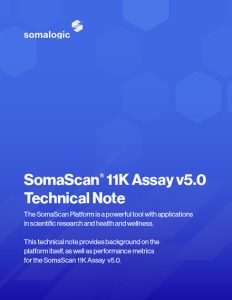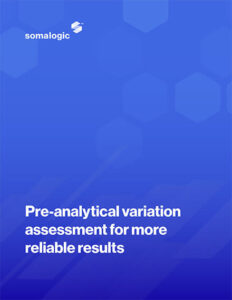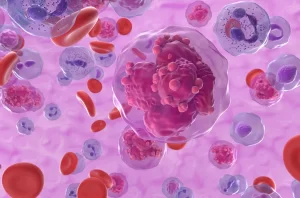High-plex protein profiling for cancer research: Maximize target selection and validation
The SomaScan® Assay profiles thousands of proteins in a 55-μL blood sample and efficiently detects low-abundance proteins in complex biological samples.
The pioneering SomaScan® Assay empowers discovery
Understanding changes in protein expression is key to determining cancer dynamics. Critical biomarkers can then be identified when comparing the complete protein profiles of healthy and disease states. The SomaScan Platform accelerates cancer proteomics by offering high-plex protein analysis and broader coverage of up to half the human proteome. This enables the detection of proteins and protein networks related to the origin, proliferation, and metastasis of solid tumor and blood-based cancers, driving early biomarker discovery and validation for translational science and pre-clinical cancer research. The SomaScan 11K Assay now supports cell lysate and tissue homogenate samples, which allows for a more comprehensive exploration of cancer pathways and mechanisms.
Cancer-related resources
Customize your analysis for targeted results
You can choose a specialized panel of select protein targets.
Choose from:
- Your own customized panel of analytes
- One of our scientist-curated panels specific
to oncology, cytokines, and more
What’s your biomarker challenge?
The SomaScan Assay is the premier high-plex, high-throughput assay for protein profiling
| Feature | Benefit |
|---|---|
|
Profiles thousands of different proteins from only 55 μL of plasma/serum |
Obtain the most biological insights into proteins and protein networks – simultaneously |
|
Compatible for use with blood and other complex biological fluids and tissue |
Eliminate complex sample preparation inherent in mass spectrometry |
| 10-log dynamic range from femtomolar to micromolar | Achieve sensitive detection of low-abundance proteins |
|
~5% median coefficient of variation (CV) |
Maintain intra- and inter-assay reproducibility across samples/projects |
Added value features
SomaSignal® Tests for pre-analytical variation ensure data accuracy
Life Sciences customer portal provides enhanced data interpretation and visualization
Options for specialized, customized panels
New to proteomics?
The human proteome orchestrates the majority of biological processes.
Currently, >90% of drug targets are proteins.1
Learn more about the SomaScan Platform

SomaScan 11K Assay v5.0 Tech Note
The SomaScan® Platform is a powerful tool with applications in scientific research and health and wellness. This technical note provides background on the platform itself, as well as performance metrics for the SomaScan 11K Assay v5.0.

Pre-analytical variation assessment for more reliable results
In biomarker discovery, it is critical to assess any pre-analytical variation in order to avoid artificial bias in the intended measurements. Pre-analytical variation may arise from both avoidable and unavoidable factors, resulting in misleading data and incorrect conclusions.
Ready to explore our menu?
First time user? Click button below, and then click Sign Up to get started.
Dive deeper into how proteomics is advancing cancer research
WebinarProteomic risk scores can help identify high-risk patients and monitor short- and long-term effects of treatment
In this 1-hour discussion, you will learn how large-scale proteomics can be leveraged for multiple applications in the field of oncology. The focus will be on 2 new avenues of oncology research. The first is using proteomic risk scores to monitor the cardiotoxic effects of anthracycline treatment and identify patients who may benefit from cardioprotective therapy. The other is developing blood-based protein tests for stratifying lung cancer susceptibility. From biomarker discovery to medicine application and the potential to inform and impact patients’ standard of care—there is a lot to learn and look forward to in oncology research using proteomics.PosterAptamer-based analysis of plasma proteome of growing tumors
With proteins, the presence of a tumor is more often accompanied with changes in the levels of endogenous, unmutated proteins in circulation. In this context, knowing which proteins represent the earliest markers or tumor presence would be enormously useful.BLOGProteomic profiling for discovery of biomarkers and mechanistic insights into acute myeloid leukemia (AML)
Acute myeloid leukemia (AML) is a cancer of the blood and bone marrow that is characterized by the abnormal proliferation of immature myeloid cells. It is the most common type of leukemia among the adult population that accounts for about 80% of all cases1. AML is a complex, genetically heterogeneous disease, which presents challenges for treatment. Although most patients respond to standard intensive chemotherapy, approximately two-thirds of the patients relapse within 18 months to 5 years of the initial treatment2. The bone marrow microenvironment is thought to play a significant role in mediating the persistence of malignant leukemic stem cells. However, the exact nature of bone marrow–leukemic cell interactions is not well understood.White paperCirculating protein biomarkers are a promising avenue for predicting patient response to cancer immunotherapies
Cancer Immunotherapy relies on activating or enhancing the antitumor immune response and has taken a central position in cancer treatment modalities. While offering a generally safer and more efficacious alternative to standard chemotherapy and radiotherapy, not all patients respond to immunotherapy, and combination immunotherapies increase cost of treatment and heighten the risk for toxicity-related adverse events. An understanding of the molecular factors that contribute to clinical outcomes could enable improved selection of subject cohorts; therefore, identifying predictive biomarkers of immunotherapy response has become a growing focus of immuno-oncology research.The study of proteins is the missing ‘-omic’ in the study of cancer. Having proteomic measurements in our data gives us the strongest case for the integration of genetics, behavior and environment in improving the prediction of disease.”
Professor of Cancer Epidemiology and Prevention,
Imperial College London
In current -omics era, discovery and validation of protein biomarkers are essential for both research and clinical practice having huge impact on early cancer detection, diagnosis improvement, recurrence prevention, therapeutic response monitoring and increased survival outcome. Developing cancer risk-identifier biomarkers that aid both early detection and targeted therapy constitutes an essential aim of the oncology field.”
Curated cancer research publications
Search all our 1,000+ peer-reviewed publications.
Go to our publications viewer, and type keyword “cancer” to narrow your search.
Learn more about SomaLogic products
SomaScan Assay
The proteomics revolution is now, and SomaLogic is here to partner with you in your discoveries.
SomaScan Panels
Focus your protein profiling with curated panels – designed with a selection of protein targets for drug discovery and development
SomaSignal PAV
See how SomaSignal® Tests for pre-analytical variation can help and how for a limited time you can receive sample tests for free!
Ready to discover proteins you never even knew were there?
Contact us to add the only high-throughput,
high-plex assay with unequaled sensitivity to your cancer research.
References
- Ghadermarzi S, et al. Sequence-derived markers of drug targets and potentially druggable human proteins. Front Genet ID (2019 ). doi:10.3389/fgene.2019.01075






